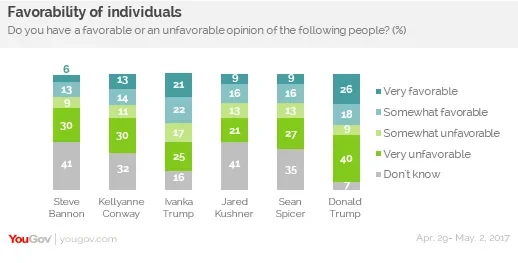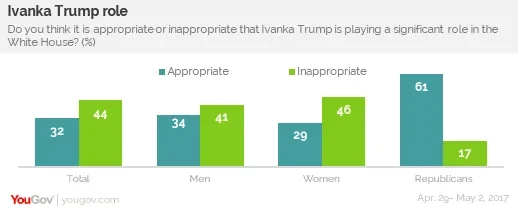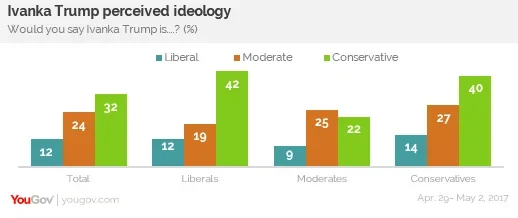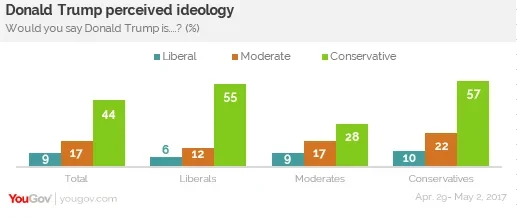43% of Americans have a favorable opinion of Ivanka Trump while 44% of Americans have a favorable opinion of her father, Donald Trump
Although First Daughter Ivanka Trump may hope to soften her father’s image, her image also has been affected by partisan politics: while she is the most popular of five Trump Administration White House appointees asked about in this week’s Economist/YouGov Poll, getting the best grades in that group from the public means that she receives as many unfavorable ratings as favorable ones. But grading on a curve gives her an A among four unpopular Administration figures.

Like her father, Ivanka fares better with men than with women: men have a favorable opinion of her (46% to 38%) women are narrowly negative. Of course, men are also more likely than women to call themselves Republicans. President Trump gets slightly more negative evaluations than his daughter does. Ivanka gets more positive evaluations than both her husband Jared Kushner and the President’s other female White House senior advisor, Kellyanne Conway.
But both men and women express concern over the position she holds in the White House, with more calling it “inappropriate” for her to be playing a significant role there than appropriate.

As with so many survey questions about the Trump Administration, there is a big partisan divide. Most Republicans have no problem with Ivanka Trump’s White House role. Fewer than one in five view it as inappropriate. Independents and Democrats lean negative.
For the most part, Ms. Trump is not seen as especially concerned about the needs and problems of women. 53% of women say Mr. Trump cares little or nothing about their needs and problems; 51% say the same about Ms. Trump. Women are more likely to take the extreme position (“doesn’t care at all”) when asked about the President than when asked about his daughter. 43% of women think President Trump cares not at all about them; 32% say that about Ivanka. And by 46% to 28%, women do not see Ivanka as a “champion of female empowerment.”
She is seen as ideologically less conservative than her father, but by no means do Americans think she is a liberal. But the public is as likely to say she is a liberal or a moderate as to think she is a conservative. That is true for both moderates and conservatives. Liberals are more likely to see her as conservative.


Her father is much more likely to be called a conservative by the public. 44% overall see him that way, including a majority (57%) of self-identified conservatives. But about one in three can’t categorize either Trump ideologically.








